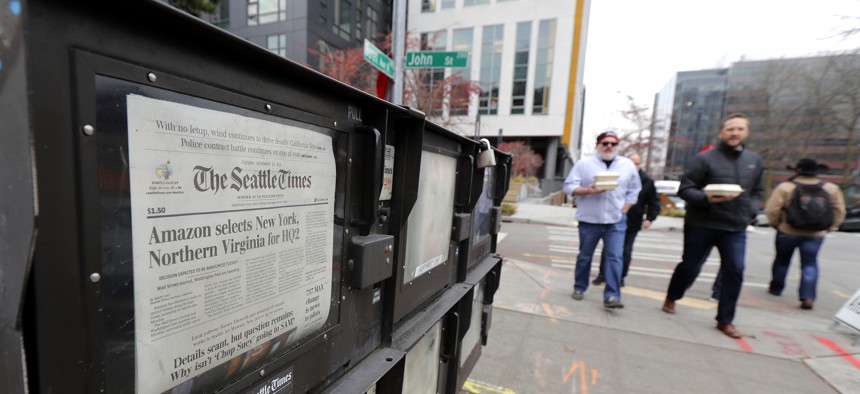Connecting state and local government leaders
Local newspapers keep readers’ focus on local politics and issues.
It seems impossible to ignore national politics today. The stream of stories about the president and Congress is endless. Whether online, in print or on television, it has never been easier to follow the action.
National news outlets are adapting well to this environment: The New York Times and Wall Street Journal made big gains in digital subscribers in 2016 and 2017, CNN had their most-watched year ever in 2018 and The New York Times added 120 new newsroom staffers this year.
Local newspapers are not doing as well. The past decade was brutal for the local press, and the numbers behind the collapse of local newspapers are staggering.
In 2006, American newspapers sold over $49 billion in ads, employed more than 74,000 people and circulated to 52 million Americans on weekdays.
By 2017, ad revenues were down to $16.5 billion (a 66.4 percent drop); the newspaper workforce fell by 47.3 percent, to just over 39,000; and weekday circulation fell below 31 million.
At a time when national political news is inescapable, there is less local news to be found—and less interest in local politics from Americans.
This shift in media may have a direct effect on how people vote. Local newspapers help protect American democracy by giving people the information they need to hold local government accountable. They also provide an alternative to national news that is often focused on partisan conflict.
As political scientists and communications scholars who study the media’s influence on voters, we wanted to know whether these changes in the news industry had political effects.
A Polarizing Nation
In our new study, we show that the loss of local news leads to political polarization, making governing more difficult locally and nationally.
We began with a hunch: If people are reading more nationalized news when their local newspapers decline, they might become more polarized themselves and vote accordingly.
American politics became more polarized along party lines over the past 50 years.
National news focuses on that polarization and conflict, covering the partisan fights in Washington and framing politics as a game with winners and losers. In doing so, national news makes the parties seem more different and emphasizes their conflicts.
Our study examined split-ticket voting—where a person votes for candidates of both parties on Election Day—as a way to measure polarization in areas where local news is suffering.
Americans have frequently voted for different parties in state and national elections in the past. But split-ticket voting declined in recent years as politicians and the electorate became more polarized.
In 1992, for example, voters in more than one-third of the states holding Senate elections elected a senator from a different party than they voted for in the presidential election.
In 2016, there were no states in which voters did this, and more voters cast straight party-line ballots than at any point in the past century.
Real Political Effects
We also looked at the most extreme example of declining local news: newspapers that closed or merged.
The majority of closed newspapers were weeklies such as the tiny Clarke Courier of Virginia or the alt-weekly Boston Phoenix, though the data also included some major metropolitan dailies, such as the Rocky Mountain News of Denver.
We documented 110 closures between 2009 and 2012 and compared split-ticket voting in the 2012 election in those counties to statistically similar counties that did not lose a newspaper.
We found that the decline of local newspapers and the “nationalization” of political news are polarizing vote choice: Voters were 1.9 percent more likely to vote for the same party for president and senator after a newspaper closes in their community, compared to voters in statistically similar areas where a newspaper did not close.
While 1.9 percent may not seem like a lot, that is often enough to win an election.
For example, in 2018, the U.S. House races in Minnesota’s 1st district, Utah’s 4th district and Illinois’s 13th district were all decided by less than that margin.
We thought there could be two explanations for our finding: Either people switched to national news once their local newspaper closed or they lost the information they needed to vote in more local races.
We assessed these options by looking at “ballot roll-off,” when voters leave their ballots blank for lower-level offices. If roll-off increased, that would show that people did not feel like they had enough information to vote in state elections.
We did not find higher roll-off after newspapers closed. The partisan voting we found is probably due to switching to national news, not feeling less informed about local politics.
We also tested whether losing a newspaper in 2013 or 2014 explained split-ticket voting in 2012 and found that it did not. It matters whether an area actually loses a newspaper, not just that it is the kind of place that will lose a newspaper.
Local newspapers provide a valuable service to democracy by keeping readers’ focus on their communities.
When they lose local newspapers, we have found, readers turn to their political partisanship to inform their political choices.
If Americans can tear themselves away from the spectacle in Washington and support local news with their dollars and attention, it could help to push back against the partisan polarization that has taken over American politics today.
Joshua P. Darr is an assistant professor of political communication at Louisiana State University ; Johanna Dunaway, is an associate professor of communication at Texas A&M University , and Matthew P. Hitt is an assistant professor of political science at Colorado State University
This article is republished from The Conversation under a Creative Commons license. Read the original article.

NEXT STORY: The East Coast Is Going to Get Arkansas-ified



